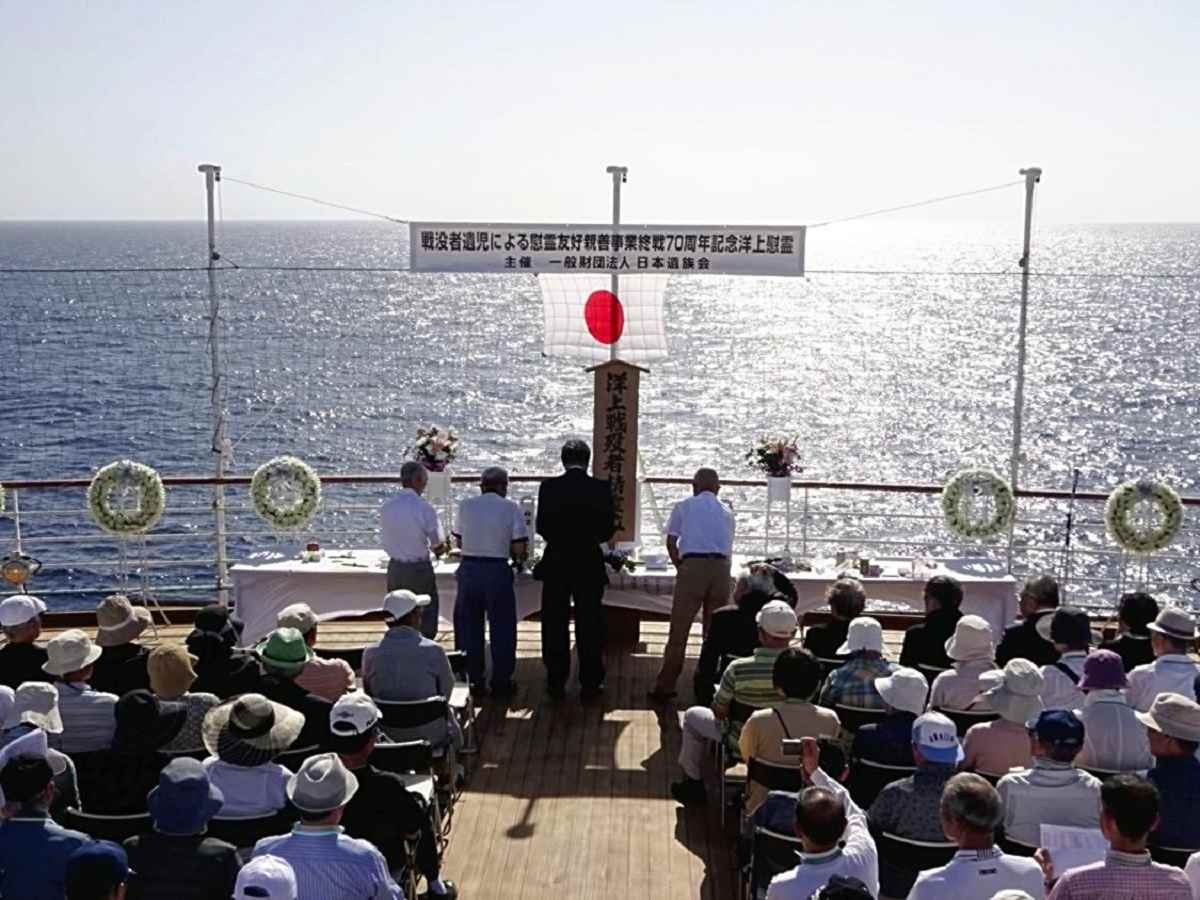WW2 War Dead Memorial Tours to End Next Year; Program Connected Bereaved Families to Battlefield Locals

A shipboard memorial service is held off the Palau Islands in March 2016.
20:00 JST, August 21, 2024
A series of battlefield tours to memorialize the dead of World War II will come to a close next year, which will mark the 80th anniversary of the end of the war, the tour organizer has said.
In the tour program, people who lost relatives in WWII visit the sites of some of the war’s fiercest battles, where they offer prayers to the war dead. While the program has brought comfort to bereaved families and taught future generations about the tragedy of war, it has become difficult to continue as the participants have gotten older.
The program was started by the Nippon Izokukai (Japan War-Bereaved Families Association) in 1991. Through the last fiscal year, a total of 426 tours had been held, including visits to China, the Philippines and various Pacific islands, as well as shipboard memorial services, with a total of 16,149 bereaved family members having participated.
Unlike the national government-sponsored memorial program for overseas war dead, this tour program is characterized by active interactions with local residents, with the intention of “sharing sorrow with locals who got caught in the war and building a society where war will never happen again.”
The tour participants have visited schools and hospitals and donated school supplies and wheelchairs. In 1997, they were told by residents in Myanmar that old school buildings had been inundated by rain, which led to a large mosquito infestation and a subsequent outbreak of malaria. In response to this, they collected donations which were used to build three new elementary schools in the country.
An 80-year-old woman of Kurashiki, Okayama Prefecture, first visited Myanmar, where her father died, with the program in 1994. Since then, she has visited the country a total of about 20 times, including personal trips. When she visited an elementary school that had been newly built with donations, children there sang “Furusato” (Hometown) in Japanese for her, which Fujiwara says moved her a lot.
“It’s a sad place where battles were fought. But I was glad that the connection I had to it through my father led to a brighter future for children,” she said.
However, it is becoming difficult to hold memorial services on actual battlefields as bereaved family members are getting older. In 2005, 911 people participated in the program, but that number has declined little by little. In fiscal 2020 and 2021, no tours were held due to the COVID-19 pandemic. The suspension period led to a further drop in the number of participants, which fell to 248 in fiscal 2023.
Next fiscal year marks the 80th anniversary of the end of WWII, so the association has decided to end the program. The final tour, to be held next year, will include activities in the Philippines and a shipboard memorial service.
Toshiei Mizuochi, 81, Nippon Izokukai president and former House of Councillors member, commented, “We would like to consider what we can do to bring about the permanent peace that the bereaved family members wish for.”
The association will focus on collecting the remains of war dead and helping witnesses to tell their stories.
The government-sponsored program will be continued in the future.
Top Articles in Society
-

Producer Behind Pop Group XG Arrested for Cocaine Possession
-

Man Infected with Measles Reportedly Dined at Restaurant in Tokyo Station
-

Man Infected with Measles May Have Come in Contact with Many People in Tokyo, Went to Store, Restaurant Around When Symptoms Emerged
-

Woman with Measles Visited Hospital in Tokyo Multiple Times Before Being Diagnosed with Disease
-

Australian Woman Dies After Mishap on Ski Lift in Nagano Prefecture
JN ACCESS RANKING
-

Producer Behind Pop Group XG Arrested for Cocaine Possession
-

Japan PM Takaichi’s Cabinet Resigns en Masse
-

Man Infected with Measles Reportedly Dined at Restaurant in Tokyo Station
-

Israeli Ambassador to Japan Speaks about Japan’s Role in the Reconstruction of Gaza
-

Videos Plagiarized, Reposted with False Subtitles Claiming ‘Ryukyu Belongs to China’; Anti-China False Information Also Posted in Japan






















